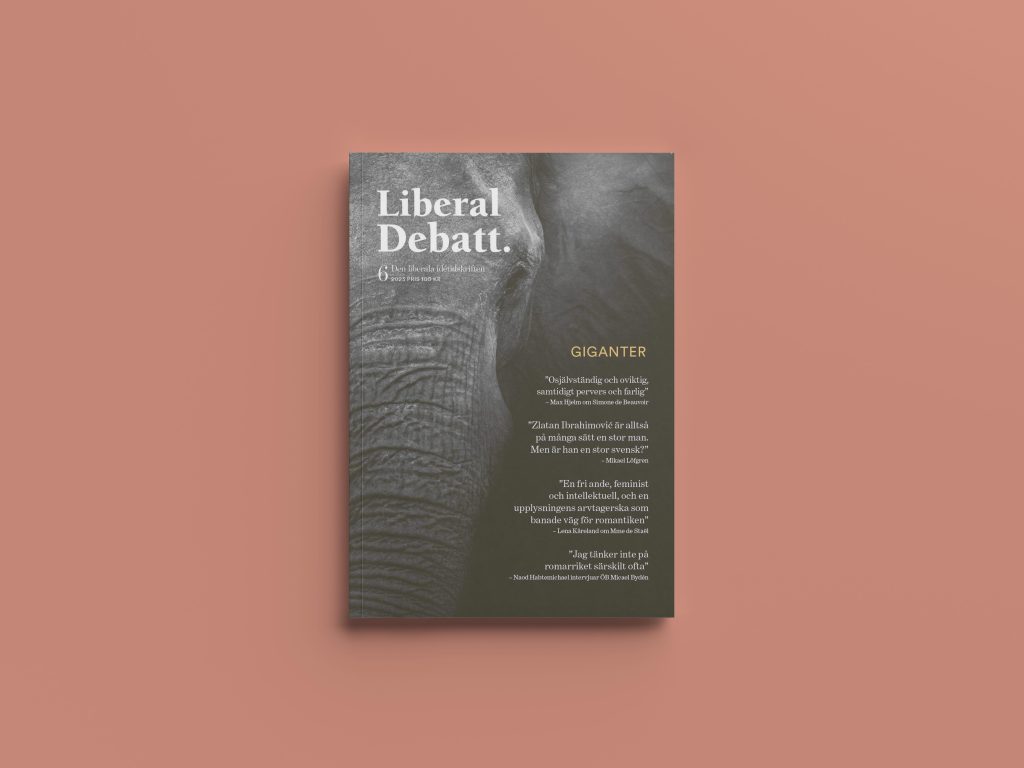In Liberal Debatt, Thea Andersson calls for a break in the deadlock afflicting recent Swedish politics. At a time when Swedish governments are based on long and heavily negotiated agreements, forming fractious coalitions, words alone have lost their power. Andersson asks: ‘maybe we’re only looking for one person – a giant’.
But is Sweden too small for political giants? Not at all. Traditionally, its political history has been shaped by people whose mere existence has transformed the political climate, bringing the country together rather than polarizing it. Former prime ministers Olof Palme and Tage Erlander, late UN-secretary Dag Hammarskjöld… there is a long list to choose from.
‘To be a giant, you have to be flawless, always thoughtful, and never have written any bad thoughts in online forums that remain forever’, writes Andersson. Today the imperative to compromise may be too strong to resist, and pragmatism may be so deeply embedded in the system that it is impossible to break. Could competition and self-interest have made the space too small for a potential giant?

Top View Magazine Mockup by Anthony Boyd Graphics
A feminist giant
During the early nineteenth century, as feudal social structures and the power of the nobility started to dissolve, the centre of Swedish intellectual life shifted to the market-driven urban bourgeoisie. In this early stage of commercialisation and capitalism, women emerged as participants in the public sphere. Henrik Dalgard writes on the revolution that changed Swedish literature and culture – and on one of its main protagonists: Fredrika Bremer.
Brought up in an authoritarian household but with an early interest in liberal British thinkers, Bremer became the most profound feminist author in Sweden at the time. While the family unit as a limiting power over female life remains at the centre of her novel Hertha, the ‘woman’s right to exist as an individual with her own agency and right to self-realization’ was the most important idea.
The message was spread not only through the novel itself, but in newspaper reviews and opinion pieces distributed throughout the country during its early stages of modernization. The wide debate sparked by Hertha during the 1850s resulted in the granting of legal status to women for the first time.
It was through the commercial press that the ideas of Hertha could be spread, even popularized, argues Dalgard. It made Fredrika Bremer not just an important intellectual during her time but, 150 years later, a feminist giant.
Giant or outsider?
At 1, 95 cm, 95 kg and shoe-size 47, Zlatan Ibrahimović is a big man. Mikael Löfgren explores how the footballing hero continues to challenge perceptions of what a Swedish giant can be. ‘Zlatan’s audacity was a long-awaited middle finger to the know-it-alls of majority society,’ he writes.
After his breakthrough around the 2000s, Ibrahimović – or Zlatan as he is ubiquitously referred to in his home country – became the contemporary fairy-tale figure of the Swedish welfare state: a symbol of multicultural society, who through football had been brought out of poverty into prosperity.
In 2017, his home club Malmö FF erected a statue in front of the stadium depicting Zlatan in pose of celebration, in superhuman size and with muscles swelling. At the unveiling, Zlatan declared it was ‘a symbol for all who feel like they don’t fit in, or look like others. I am a living proof of exactly this. If I can do it, so can others. We are all the best at what we do.’
A month later, Zlatan invested money in a rival club, Hammarby Stockholm. The anger of the Malmö supporters resulted in regular attacks against the statue, often with racist overtones. It was eventually removed to a secret location.
Zlatan had overestimated his global stardom and overlooked football’s tribalism, writes Löfgren. Kaxig (cocky) is the best word to describe him – a trait stemming from his own experience of alienation, one that will always react against something particularly normative in Swedish culture.




